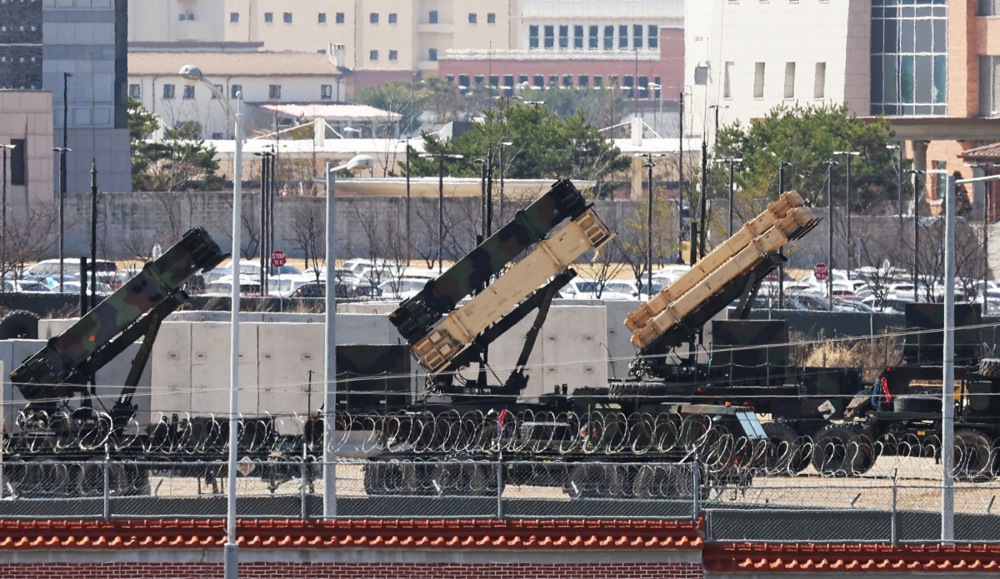A deal between Donald Trump and European NATO states to get desperately needed Patriot air defence systems to Ukraine hangs on just how quickly new batteries can be shifted to the continent.
Several European countries initially signalled interest in doing a deal, viewing Trump’s proposal to quickly sell new air defence systems to European militaries that donate their Patriots as a way of keeping key US weapons flowing to Ukraine, while avoiding major gaps in their own capabilities.
Ukrainian President Volodymyr Zelenskyy has been seeking additional Patriot batteries for years as his country faces relentless Russian air attacks, and said last week that he hopes to receive 10 more.
The six European countries that operate Patriot systems – Germany, Greece, the Netherlands, Poland, Romania and Spain – are reported to own somewhere around two dozen as part of their own inventories.
Since 2022, Kyiv has received six operational Patriot batteries supplied by the US, Germany, Romania, and the Netherlands, according to UK-based arms monitor Action on Armed Violence.
But European arsenals have already been depleted by previous donations to Ukraine, and there are concerns about potentially lengthy gaps in their own air defences if US deliveries are not as prompt as Trump suggested.
Fuelling demand
Global demand for the US-made advanced air defence systems wildly outstrips supply, with waiting times for newly ordered Patriots running to several years. That’s in addition to price tags of around $1 billion per battery, and $4 million for each interceptor missile.
Giving up air defence systems like Patriots is “scary”, a high-ranked European diplomat told Euractiv. “You do it for Ukraine, because they defend us.”
Germany, which took the lead on the latest donations, asked for “watertight” guarantees from Washington that it will receive new US air defence systems within a eight months before shipping more Patriots from their current stockpiles, Defence Minister Boris Pistorius said last week.
Berlin issued a confirmation on Friday that it will get prioritised for the delivery of brand-new Patriots, allowing the government to declare it will deliver more of its own systems to Kyiv in the next few days. That means that Switzerland, which signed a deal for Patriots back in 2022, will now see the delivery of its units delayed.
Berlin has already sent three Patriot system to Ukraine and initially agreed to deliver five more. But those previous donations, and deployments of two more German Patriot batteries to NATO’s Eastern flank, mean that Berlin has at most six Patriot systems left.
Ready and willing
Norway and the Netherlands have also told Ukraine they will participate in the deal.
The US ambassador to NATO, Matthew Whitaker, said earlier this month that the US is “looking at what we have available both in our possession and across our defence sector, and prioritising and making it available for the defence of Ukraine”.
“The key issue then becomes which countries are treated as priority customers,” Trevor Taylor, a fellow at the London-based Royal United Services Institute (RUSI), told Euractiv.
“Decisions here lie with the president of the United States,” Taylor added.
But there remain serious questions about how fast the US will deliver.
Romania paid a price when it sacrificed a major part of its arsenal by giving up one of its two operational Patriot systems last year. Officials hoped the US could speed up orders for new Patriots, but when the contract for replacements was inked months later, the delivery date was set for the end of the decade.
Long waitlists, slow production increases
NATO’s Supreme Allied Commander Transformation, French Admiral Pierre Vandier, estimates that the lead time for delivery of new Patriot batteries is around seven years. Another well-placed source who spoke with Euractiv was more optimistic – but still said deliveries would take at least a couple of years.
Two of the key US defence contractors involved in Patriot missile production, Lockheed Martin and Raytheon, are increasing output from around 500 to 650 missiles per year.
Raytheon “will increase monthly GEM-T interceptor production by 150% between now and 2028 to meet unprecedented demand”, a company spokesperson told Euractiv, referring to an updated variant of the missiles used by the Patriot system.
The spokesperson added that the company has also committed almost $1 billion to secure critical materials from suppliers and ramp manufacturing for radars.
Last month, the head of Raytheon’s Air defence systems Division told Euractiv that the company’s expansion faces similar supply chain issues to other manufacturers, notably in access to energetics.
(bts, aw, jp)
